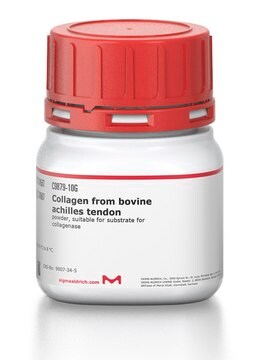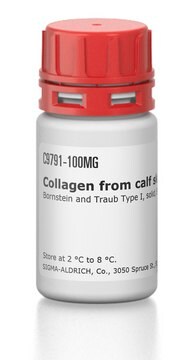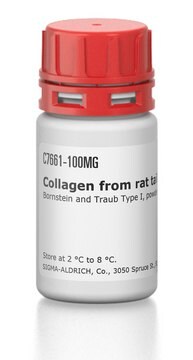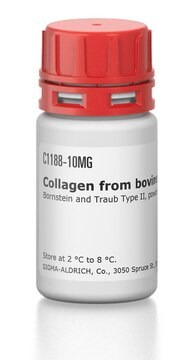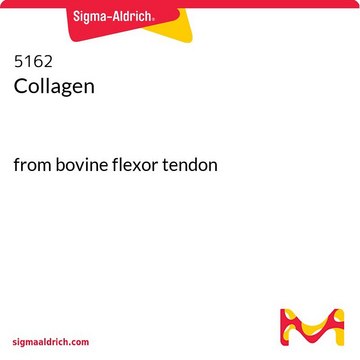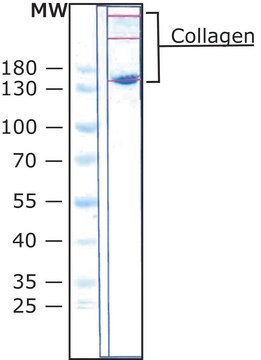C5608
Collagen from rabbit skin
Bornstein and Traub Type I, powder
Sign Into View Organizational & Contract Pricing
All Photos(1)
About This Item
Recommended Products
biological source
rabbit skin
Quality Level
description
acid soluble
form
powder
technique(s)
cell culture | stem cell: suitable
solubility
aqueous acid: ≤10 mg/mL
aqueous sodium acetate buffer: soluble (0.01-0.5M)
UniProt accession no.
storage temp.
2-8°C
Gene Information
rabbit ... COL1A2(100008997)
General description
Collagen is classified into a number of structurally and genetically distinct types. We use the nomenclature proposed by Bornstein and Traub. Do not confuse Sigma type designations with recognized collagen classification types.
Application
Collagen-type 1 may be used in research of Idiopathic pulmonary fibrosis (IPF). Robust expression of collagen-type 1 is one distinctive feature of IPF. Additionally, collagen-type 1 has been used in studies on the effect of endoplasmic reticulum (ER) stress from IPF on myofibroblastic differentiation of lung fibroblasts. Collage-type 1 soluble in acidic solution produces three dimensional scaffolding useful in bioengineering and cell culture applications where biomaterials are needed to replace native collagen extracellular matrices.
Collagen Type I has been used as a scaffold for the growth in vitro of stem cells in a wide variety of biomaterial engineering studies.
Collagen Type I has been used as a scaffold for the growth in vitro of stem cells in a wide variety of biomaterial engineering studies.
Preparation Note
Prepared with modification of Gallop, P.M.
Storage Class Code
11 - Combustible Solids
WGK
WGK 1
Flash Point(F)
Not applicable
Flash Point(C)
Not applicable
Personal Protective Equipment
dust mask type N95 (US), Eyeshields, Gloves
Choose from one of the most recent versions:
Already Own This Product?
Find documentation for the products that you have recently purchased in the Document Library.
Customers Also Viewed
Marco Esposito et al.
European journal of oral implantology, 6(2), 169-179 (2013-08-09)
To compare the clinical effectiveness of two implant systems: Way Milano and Kentron (Geass, Pozzuolo del Friuli, UD, Italy). A total of 64 patients requiring at least two single crowns or partial fixed dental prostheses supported by a maximum of
Pietro Felice et al.
European journal of oral implantology, 6(2), 153-165 (2013-08-09)
To compare the efficacy of 1-stage versus 2-stage lateral maxillary sinus lift procedures. Sixty partially edentulous patients requiring 1 to 3 implants and having 1 to 3 mm of residual bone height and at least 5 mm of bone width
Daichi Morikawa et al.
Journal of shoulder and elbow surgery, 23(5), 628-635 (2014-04-22)
Rotator cuff degeneration is one of the multiple factors that lead to rotator cuff tears; however, the precise mechanism of such degeneration still remains unclear. In this study, we investigated the supraspinatus tendon enthesis to clarify the link between rotator
Simon Holland et al.
Current opinion in ophthalmology, 24(4), 302-309 (2013-05-18)
Topography-guided laser refractive surgery regularizes the front corneal surface irregularities to achieve the desired refractive outcome. This is particularly applicable in highly aberrated corneas, where wavefront aberrometry is often not possible. This article aims to review the recently published results
Pietro Felice et al.
European journal of oral implantology, 7(1), 65-75 (2014-06-04)
To compare the efficacy of 1-stage versus 2-stage lateral maxillary sinus lift procedures. Sixty partially edentulous patients requiring 1 to 3 implants and having 1 to 3 mm of residual bone height and at least 5 mm bone width below
Our team of scientists has experience in all areas of research including Life Science, Material Science, Chemical Synthesis, Chromatography, Analytical and many others.
Contact Technical Service